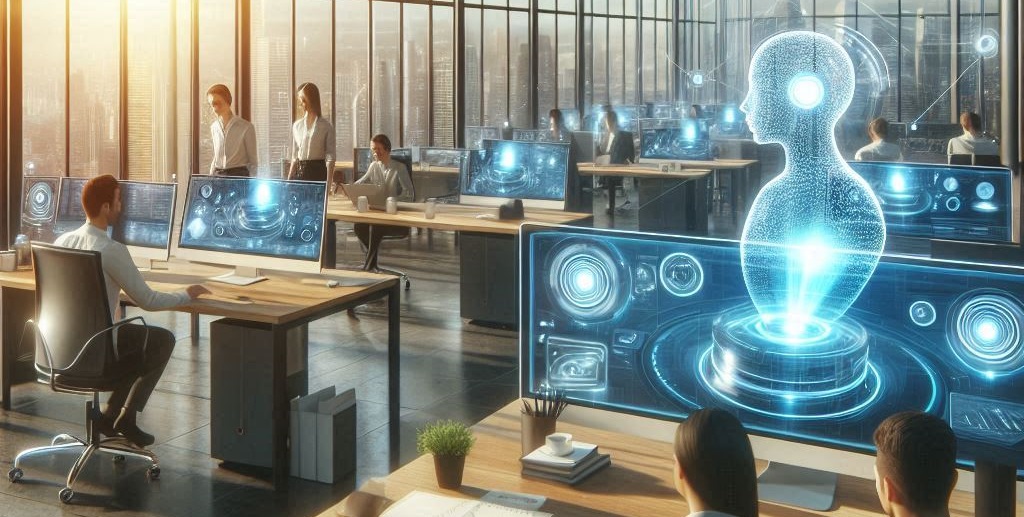In a world increasingly driven by technology, artificial intelligence (AI) has emerged as a transformative force across various industries. One of the most significant applications of AI is in the development of AI-powered personal assistants.
These digital helpers are changing the way we work, manage our lives, and interact with technology. From streamlining daily tasks to enhancing business productivity, AI-powered personal assistants are quickly becoming an indispensable tool for individuals and organizations alike.
Read More: 10 Innovative Business Ideas for 2024: Opportunities for Aspiring Entrepreneurs
This article explores the rise of AI-powered personal assistants, their benefits, challenges, and the future of this rapidly evolving technology.
The Evolution of Personal Assistants
The concept of a personal assistant has evolved dramatically over the past few decades. Traditionally, personal assistants were human employees who helped manage schedules, communications, and other administrative tasks for executives and busy professionals.
With the advent of digital technology, the role of personal assistants began to shift, first with simple digital tools like email and calendar apps, and later with more sophisticated software solutions.
The introduction of AI-powered personal assistants represents the latest and most significant evolution in this space. These assistants, which include popular platforms like Apple’s Siri, Amazon’s Alexa, Google Assistant, and Microsoft’s Cortana, leverage AI and machine learning to perform a wide range of tasks.
They can schedule appointments, send messages, provide reminders, answer questions, and even control smart home devices, all through voice commands or text inputs.
The Rise of AI in Personal Assistance
AI-powered personal assistants are more than just voice-activated gadgets; they are complex systems that use natural language processing (NLP), machine learning, and data analytics to understand and respond to user commands.
The technology behind these assistants has advanced rapidly, allowing them to handle increasingly complex tasks with greater accuracy and efficiency.
One of the key factors driving the rise of AI-powered personal assistants is the widespread adoption of smartphones and smart speakers. With billions of these devices in use worldwide, consumers have easy access to AI assistants, making them a part of daily life for millions of people.
Moreover, businesses are starting to recognize the potential of AI-powered personal assistants to improve productivity, streamline operations, and enhance customer experiences.
Benefits of AI-Powered Personal Assistants
The popularity of AI-powered personal assistants can be attributed to the numerous benefits they offer to both individuals and businesses. These benefits extend beyond mere convenience, touching on areas like productivity, efficiency, and personalization.
1. Increased Productivity
AI-powered personal assistants can significantly boost productivity by automating routine tasks that would otherwise consume valuable time. For instance, they can manage schedules, set reminders, organize emails, and even draft responses to messages. By handling these tasks, AI assistants free up time for more critical activities, allowing users to focus on work that requires creativity and strategic thinking.
In a business context, AI-powered assistants can manage team schedules, coordinate meetings across different time zones, and automate repetitive tasks like data entry and report generation. This leads to a more efficient workflow, reducing the burden on human employees and minimizing the risk of errors.
2. Enhanced Personalization
One of the standout features of AI-powered personal assistants is their ability to learn from user behavior and preferences. Over time, these assistants become more attuned to the specific needs and habits of their users, offering personalized recommendations and insights.
For example, an AI assistant might suggest alternative routes for a daily commute based on traffic patterns or recommend nearby restaurants based on previous dining preferences.
This level of personalization extends to business applications as well. AI-powered assistants can analyze customer data to provide tailored recommendations, improving customer satisfaction and driving sales. In marketing, these assistants can help businesses create personalized campaigns by analyzing consumer behavior and predicting trends.
3. Seamless Integration with Other Technologies
AI-powered personal assistants are designed to integrate seamlessly with other technologies, creating a cohesive and efficient digital ecosystem. They can connect with smart home devices, IoT systems, and various business software platforms to automate a wide range of tasks.
For instance, a personal assistant can control smart lights, thermostats, and security systems with voice commands or manage inventory and supply chain operations through integration with enterprise resource planning (ERP) systems.
This interoperability enhances the functionality of AI-powered personal assistants, making them a central hub for managing various aspects of both personal and professional life.
4. 24/7 Availability
Unlike human assistants, AI-powered personal assistants are available around the clock. This constant availability is particularly beneficial for businesses that operate across multiple time zones or have customers who require support outside of standard business hours. AI assistants can handle customer inquiries, provide information, and perform tasks at any time of day, ensuring that operations continue smoothly without interruptions.
5. Cost Savings
For businesses, AI-powered personal assistants can lead to significant cost savings. By automating routine tasks, companies can reduce the need for additional administrative staff, lowering labor costs. Additionally, AI assistants can perform tasks more quickly and accurately than humans, reducing the time and resources spent on manual processes.
Challenges of AI-Powered Personal Assistants
While the benefits of AI-powered personal assistants are clear, there are also several challenges associated with their use. These challenges must be addressed to fully realize the potential of this technology.
1. Privacy and Security Concerns
One of the most significant challenges facing AI-powered personal assistants is privacy and security. These assistants often require access to sensitive personal and business information to perform their tasks effectively. This raises concerns about how this data is stored, managed, and protected. There have been instances where AI assistants inadvertently recorded private conversations or were hacked, leading to data breaches.
To mitigate these risks, it is essential for developers to implement robust security measures, such as encryption and multi-factor authentication, and for users to be aware of how their data is being used. Additionally, businesses must comply with data protection regulations, such as the General Data Protection Regulation (GDPR) in Europe, to ensure the privacy of their customers and employees.
2. Dependency and Reliability
As AI-powered personal assistants become more integrated into daily life, there is a growing concern about over-dependence on these tools. Users may become too reliant on AI assistants for basic tasks, leading to a decline in critical thinking and problem-solving skills. Additionally, the reliability of AI assistants can be a concern, as they are not infallible and can make mistakes or fail to understand complex commands.
To address these challenges, it is important for users to strike a balance between leveraging AI assistants for efficiency and maintaining their own cognitive abilities. Regular updates and improvements to the technology can also help enhance the reliability and accuracy of AI-powered personal assistants.
3. Ethical Considerations
The use of AI-powered personal assistants raises ethical questions about the impact of AI on jobs, privacy, and decision-making. As AI continues to evolve, there is a concern that it could replace human jobs, particularly in administrative and customer service roles. Additionally, the ability of AI assistants to collect and analyze vast amounts of data raises concerns about surveillance and the potential for misuse of information.
Businesses and developers must navigate these ethical considerations carefully, ensuring that AI-powered personal assistants are used in ways that benefit society while minimizing negative impacts. This includes promoting transparency, accountability, and fairness in AI systems.
4. Language and Cultural Barriers
Although AI-powered personal assistants are becoming increasingly sophisticated, they still face challenges in understanding and responding to different languages, dialects, and cultural nuances. This can lead to misunderstandings and limit the effectiveness of AI assistants in diverse environments.
To overcome these challenges, ongoing advancements in natural language processing and AI training are needed. By improving the ability of AI assistants to understand and adapt to different languages and cultures, developers can make these tools more accessible and effective for a global audience.
The Future of AI-Powered Personal Assistants
The future of AI-powered personal assistants is incredibly promising, with continued advancements in AI technology driving new capabilities and applications. Several trends are likely to shape the evolution of this industry:
1. AI Assistants in Business
As AI-powered personal assistants become more sophisticated, businesses are likely to integrate them into more aspects of their operations. In addition to administrative tasks, AI assistants could take on roles in customer service, sales, and even decision-making. For example, AI assistants could analyze market data to provide strategic recommendations or manage customer interactions through advanced chatbots.
2. Improved Human-AI Collaboration
The future of AI-powered personal assistants will likely involve greater collaboration between humans and AI. Rather than replacing human workers, AI assistants will complement human skills, enabling people to focus on higher-level tasks that require creativity, empathy, and complex decision-making. This collaboration could lead to more efficient workflows and innovative solutions to business challenges.
3. Enhanced Personalization and Context Awareness
Advances in machine learning and data analytics will enable AI-powered personal assistants to offer even greater personalization and context awareness. These assistants will be able to anticipate user needs, provide proactive suggestions, and adapt to changing circumstances in real-time. This level of personalization will make AI assistants an even more valuable tool for managing both personal and professional life.
4. Ethical AI Development
As the use of AI-powered personal assistants expands, there will be a growing emphasis on ethical AI development. This includes ensuring that AI systems are transparent, fair, and accountable, as well as addressing concerns about privacy, bias, and job displacement. By prioritizing ethical considerations, developers can build AI assistants that are trusted and accepted by users and society as a whole.
Conclusion
AI-powered personal assistants are revolutionizing the way we live and work, offering unprecedented levels of convenience, productivity, and personalization. As these tools continue to evolve, they will play an increasingly important role in both our personal and professional lives.
However, realizing the full potential of AI-powered personal assistants requires addressing the challenges of privacy, security, and ethics. By doing so, businesses and individuals can harness the power of AI to create a more efficient, connected, and sustainable future.








